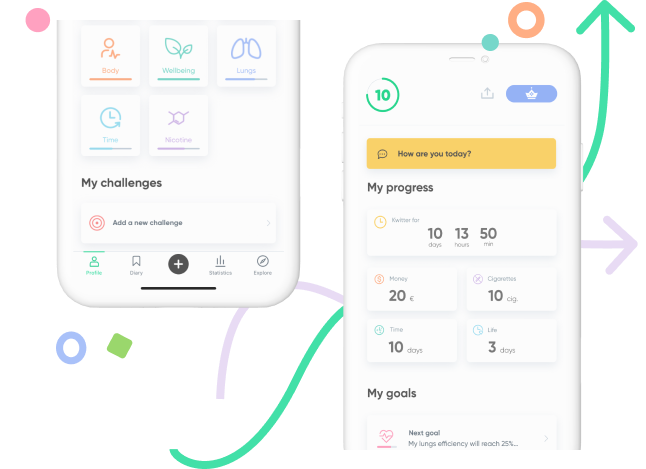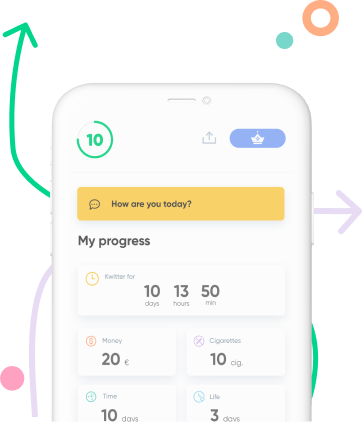November 9, 2022
Tips
Smoking during pregnancy: the risks you need to know
Smoking during pregnancy is dangerous for mother and child. We answer the most common questions about smoking effects and risks for pregnant women.
It's no secret that tobacco smoke is harmful to your health. But are you aware of the health risks for babies born to smoking women? If you're pregnant or planning to start a family, protecting your baby from tobacco smoke is one of the best things you can do to give your child a healthy start.
Exposure to tobacco smoke can cause a range of health problems in babies, including low birth weight, respiratory problems, and SIDS (sudden infant death syndrome).
Babies exposed to tobacco smoke are also more likely to develop asthma, bronchitis, and other respiratory illnesses.
In this blog post, we will answer the most frequently asked questions about the risks of smoking during pregnancy and share some tips on quitting smoking while pregnant. Keep reading!
Does smoking affect fertility?
The answer is yes. Smoking women have a lower chance of becoming pregnant. Chemicals in smoke disrupt the function of the tubes. Inhaling this smoke could reduce fertility or cause fertility problems. Researchers have also discovered that smoking may alter the DNA in men's sperm. This DNA damage could reduce fertility, cause congenital disabilities, or result in miscarriage.
If you want to know more about fatherhood and tobacco, read this article .
Tobacco contains many harmful and carcinogenic compounds, such as cyanide or lead. However, nicotine and carbon monoxide are the most dangerous for the developing baby.
You should know that the blood supply from the mother is the primary source of oxygen and nutrients to the fetus throughout pregnancy. When you smoke during pregnancy, all these compounds pass into the bloodstream and reach the fetus through the umbilical cord.
Nicotine and carbon monoxide reduces the oxygen the baby receives and, consequently, affect its expected development in the uterus. Some consequences are:
Low birth weight: On average, children born to smoking women weigh an average of 200 grams less.
Withdrawal syndrome: babies born to smoking mothers are at increased risk of showing signs of withdrawal syndrome at birth, such as irritability, tremors, and sleep disturbances. In the long term, smoking in pregnancy can lead to behavioral deficits in children, lower IQ, decreased attention span, and hyperactivity.
Premature delivery: higher risks of developing placenta previa (the placenta sits low in the womb and covers the cervix) or placental abruption before delivery. Both are also very likely to co-occur. In the most severe cases, a miscarriage or intrauterine fetal death may occur when nicotine levels are too high. Resulting in the birth of a lifeless baby.
Does smoking during pregnancy affect fetus development?
Yes! When smoking women have higher nicotine levels, fetus development is impacted. Nicotine constricts the blood vessels, and carbon monoxide binds to the red blood cells, displacing oxygen. The lack of oxygen then causes poor development. Here are some of the most common:
Poor lung and brain development: smoking can cause long-lasting damage to your baby's developing lungs and brain, leading to asthma and other respiratory problems.
Cleft lip or cleft palate: A cleft is an opening in the baby's lip or on the inside top of the mouth (the roof of the mouth). Your baby may have trouble eating correctly and may need surgery.
Attention deficit
Hyperactivity
Tendency to have high blood pressure
Predisposition to caries problems
Childhood overweight or obesity
At what stage of pregnancy does smoking affect the baby?
Tobacco has adverse effects on the fetus in any month of pregnancy. Nevertheless, if you are pregnant and still smoke, know that if you stop smoking during the first weeks, your baby will probably weigh the same as a woman who has never smoked.
If you are in the third or fourth month of pregnancy and want to quit, there are still a lot of benefits for you and your baby. By quitting smoking, you will reduce the chances of your baby being born prematurely or with health problems. Even if you quit smoking in the last months of pregnancy, you can help your baby get more oxygen. So don't worry! It's never too late, but the sooner you stop, the better it will be for both of you.
Does secondhand smoke impact the baby?
Yes, it is as bad as smoking during pregnancy.
Secondhand smoke is the combination of smoke from a burning cigarette and smoke exhaled by a smoker. The residual smoke produced by cigarette burning has more dangerous substances (tar, carbon monoxide, nicotine, and others) than the smoke inhaled by the smoker. No level of secondhand smoke is safe for you or the baby. The consequences of secondhand smoke exposure are similar to those of smoking women (stillbirth, a low-birth-weight baby, a baby with birth abnormalities, and other pregnancy issues.)
Besides, babies and toddlers exposed to secondhand smoke are more likely to develop asthma, allergies, and recurrent lung and ear infections.
Talk to your family, friends, and co-workers. Let them know the risks of secondhand smoke for you and your baby. Share with them these 6 tips to deal with tobacco dependence we have prepared in this article.
What about smoking while breastfeeding?
Avoiding smoking during breastfeeding is also crucial. Nicotine and other chemicals in cigarette smoke can pass from you to your baby through your breast milk. Besides, smoking can reduce your milk supply and the quality of your milk. The associated risks of using tobacco while breastfeeding may include colic and sleep disorders.
If you lack motivation and find quitting smoking while breastfeeding difficult, start by setting goals like not smoking before or during feedings. This will give your body as much time as possible to eliminate nicotine from your breast milk. Never smoke near your baby or in the same room where your baby is. It is best to smoke outdoors, away from the baby.
So, what can I do to quit?
Remember, there is no perfect way to quit smoking. Find the method that works best for you. Here are some tips you can follow to jumpstart your quit journey:
Write why you want to quit smoking. You can do this using Kwit's diary. Download the app and write when cravings occur and the context in which they appear. Doing this will give you a better understanding of what triggers you to smoke.
Get rid of the cigarette smell and everything that reminds you of smoking: packets, lighters, ashtrays, etc.
Avoid situations, people, and places that may tempt you to smoke. For example, if you used to associate a cup of coffee during your mid-morning break with a cigarette, replace it with a piece of fruit, cookie, or toast to go with your coffee.
Practice some physical activity. Exercise will help you reduce anxiety.
Make sure you reach out to family members, co-workers, and friends for support and ask them not to smoke when they are with you. This way, you will avoid temptation.
It is important to know that using substitutes for smoking women during pregnancy is not recommended. Consult with your physician before starting any treatment. If you want to quit smoking without using nicotine substitutes, read this article on how to quit smoking naturally.
What you should keep in mind
Tobacco harms both your own and your baby's health from the moment of conception until after birth.
Secondhand smoke is as bad as smoking itself.
Nicotine and other toxic chemicals present in tobacco can pass through breastmilk.
How quitting smoking benefits you and your baby:
More oxygen is delivered to the fetus, even 24 hours after quitting smoking.
Rates of miscarriage or premature delivery decrease considerably.
You feel more energetic and can breathe more easily.
Increased milk production during lactation.
Quitting smoking is the best decision you can make for yourself and your baby! You can quit now using Kwit app. A practical and easy-to-use application. Designed using CBT techniques to guide you through your cessation journey and help you quit smoking for good.




